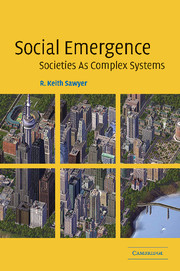Book contents
- Frontmatter
- Contents
- List of figures and tables
- Acknowledgments
- 1 Emergence, complexity, and social science
- 2 The third wave of social systems theory
- 3 The history of emergence
- 4 Emergence in psychology
- 5 Emergence in sociology
- 6 Durkheim's theory of social emergence
- 7 Emergence and elisionism
- 8 Simulating social emergence with artificial societies
- 9 Communication and improvisation
- 10 The Emergence Paradigm
- References
- Index
7 - Emergence and elisionism
Published online by Cambridge University Press: 10 May 2010
- Frontmatter
- Contents
- List of figures and tables
- Acknowledgments
- 1 Emergence, complexity, and social science
- 2 The third wave of social systems theory
- 3 The history of emergence
- 4 Emergence in psychology
- 5 Emergence in sociology
- 6 Durkheim's theory of social emergence
- 7 Emergence and elisionism
- 8 Simulating social emergence with artificial societies
- 9 Communication and improvisation
- 10 The Emergence Paradigm
- References
- Index
Summary
In this chapter I compare the emergentist view of the social world with a contemporary alternative: elisionist theories, including both Anthony Giddens's structuration theory and socioculturalism in contemporary psychological theory. Elisionist theories share two foundational theoretical assumptions: They assume a process ontology, and they assume the inseparability of individual and social levels of analysis. A process ontology holds that only processes are real; entities, structures, or patterns are ephemeral and do not really exist. As for inseparability, the assumption is that the individual and the social cannot be methodologically or ontologically distinguished; thus the name “elisionism” (coined in Archer 1995). For example, socioculturalists in education argue that the individual learner cannot be meaningfully separated from the social and cultural context of learning, and they reject a traditional view of learning in which the learner is presumed to internalize knowledge presented from the external world. Rather than internalizing knowledge, the learner should be conceived of as appropriating or mastering patterns of participation in group activities. Learning involves a transformation of the social practices of the entire group and thus cannot be reduced to an analysis of what any one participant in the group does or knows.
In comparing social emergence with elisionism, I summarize two independent debates: the contemporary sociological debate between Anthony Giddens and Margaret Archer and internal debates within sociocultural psychology. In social theory, Archer's position is representative of emergentism, and Giddens is representative of elisionism. Giddens's structuration model is founded on a process ontology and on inseparability.
- Type
- Chapter
- Information
- Social EmergenceSocieties As Complex Systems, pp. 125 - 144Publisher: Cambridge University PressPrint publication year: 2005



